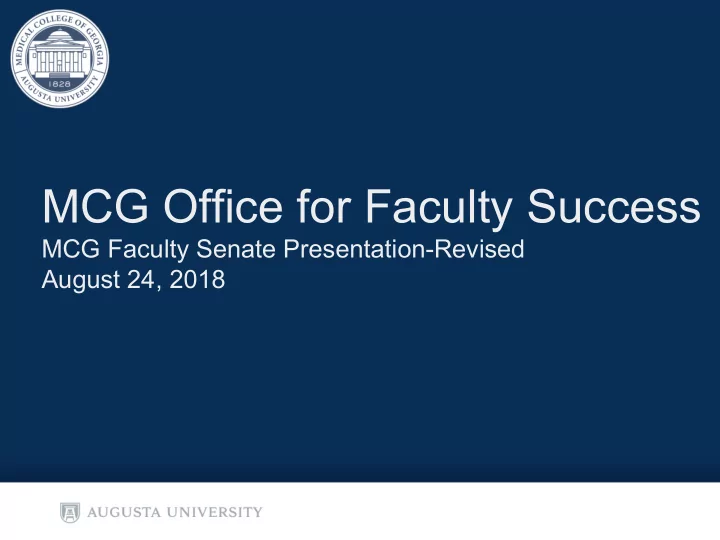

MCG Office for Faculty Success MCG Faculty Senate Presentation-Revised August 24, 2018
MCG Office for Faculty Success Objectives Describe contributing factors to creation of the Office Present the goals and structure for the Office Discuss the three primary initiatives of the Office Solicit feedback from faculty
MCG Office for Faculty Success Contributing Factors to Creation of the Office Creation of the MCG Faculty Affairs Committee (FAC) in 2017 under the leadership of Dr. Vaughn McCall, Executive Vice Dean and Associate Dean of Faculty Affairs The FAC identifies faculty concerns, brings these to the attention of the Dean, and makes recommendations for improvement Issues like mentorship, promotion and tenure, and well- being are primary issues of concern identified this year Faculty Senate Executive Committee voted to bring faculty mentorship as a top priority to the Dean in May 2018
MCG Office for Faculty Success Goals and Structure The MCG Office for Faculty Success will: 1) Oversee, promote, and build mentoring resources and capacity 2) Foster meaningful career development for faculty at all stages of their careers 3) Support and expand promotion and retention efforts critical to ensuring a diverse, skilled, and engaged MCG faculty
MCG Office for Faculty Success Goals and Structure MCG Dean’s Program Coordinator Office Tina Hall Lara M. MCG Faculty Affairs Stepleman,PhD Director MCG Office for Faculty Intern Success Yan Liang, PhD, MSc
MCG Office for Faculty Success Initiatives Faculty Career Mentoring Development Faculty Retention
Faculty Mentoring • Automate Faculty Academic Development Plan (FADP) Standardizing • Increase rate of FADP completion and use at annual Mentoring review • Providing department training in use of the FADP Faculty Developing • Create a compendium of mentoring resources Mentoring • Facilitate assessment of mentor skillsets Mentoring • Train mentors in areas for growth (i.e., coaching) Competency Improving the • Build a mentor database for mentor/mentee matching • Enable the routine evaluation of mentors Mentorship • Recognize mentors Experience • Provide relevant workshops Mentorship • Provide department-level needs assessment, consultation and training Program Growth • Develop department-specific metrics and evaluation within Departments methods for mentoring initiatives
Career Development • “ Preparing for promotion from Day 1” Workshops for All • “Creating scholarship as an educator and clinician” • “Getting unstuck in rank” Career Stages • “I’m a full professor, now what?” • “Career ownership: It’s about you” Career • Assist in assessing readiness to apply for P&T Individual P&T • Gap analysis of items inhibiting a faculty’s advancement Consultations Development • Guidance in P&T packet preparation Opportunities to • Participate on the Faculty Success Mentorship Taskforce • Engage in research on an aspect of Faculty Success Participate in • Create and/or lead trainings in content areas of expertise Faculty Success • Guidance to junior mentors as a “Mentor Thought Leader” • In areas such as negotiating for resources, building your Online Resources promotion portfolio, preparing for leadership, for Succeeding in demonstrating value, networking within and across disciplines, understanding the culture of academic Academic Medicine medicine, increasing productivity, etc.
Faculty Retention Improving the • Revise the faculty exit survey and distribution methods using best Exit Survey practices in survey administration Process • Increase exit survey participation Faculty • Pilot collaborative exit interviewing Retention Expanding the between HR and the Office for Faculty Success Exit Interview • Extend personalized exit interview Process invitations to departing faculty identified as critical losses Collecting • Pilot “stay interviews” to identify critical factors in retention Additional • Pilot “intent to leave” interviews • Consider implementing follow-up surveys of Sources of departed faculty Faculty Data • Leverage all sources of MCG faculty data to make recommendations to improve retention efforts
MCG Office for Faculty Success Feedback and Questions?
Recommend
More recommend